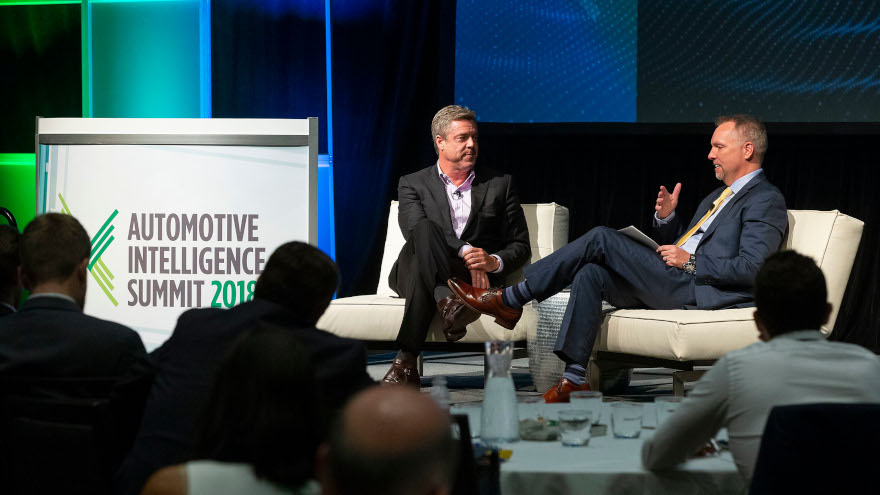One of the lead sponsors of Used Car Week 2018 is placing even more emphasis on its fintech operations.
On Monday, Digital Recognition Network (DRN), an AI and data analytics company that provides vehicle location data and analytics to finance companies, insurance carriers and other commercial verticals, announced the creation of its new client services unit — as part of its fintech division — to help its clients to be more strategic.
The client services unit can provide its clients with consulting services, on-site training and monthly reporting, so they can gain greater insight into DRN's vehicle location data (also known as automated license plate recognition, or ALPR data) and leverage the data to drive results.
Using the monthly reporting capabilities, the client services unit conducted a review of its clients’ usage and performance from January to August and found that DRN’s auto-finance clients receive a 193-percent average return on their investment from the suite of products in DRNsights.
DRN’s fintech division can help financing providers, ranging from local credit unions to top 100 auto finance companies, mitigate risk via DRNsights, its suite of products that combines DRN’s exclusive vehicle location data with analytics to provide new locations for targeting assets.
“The fintech division has expanded in the past year, as the demand for our ALPR technology has increased,” said Todd Hodnett, executive chairman and founder of DRN. “We created the client services unit to make sure that we continued to provide the best customer service possible, which includes ensuring our clients are taking optimal advantage of our solutions to achieve strong results for their businesses.”
The client services unit’s team works with clients to help them use DRN data to better understand vehicle location behavior analytics, so they can predict risk earlier and implement new collection strategies to reduce losses.
Additionally, to accommodate the needs of the growing fintech division, DRN has promoted the following team members:
• Jeremiah Wheeler has been promoted to executive vice president and general manager for DRN’s fintech division. In this role, Wheeler heads up the fintech business unit including sales, support and product management. He is responsible for developing DRN’s fintech strategy to ensure alignment with market needs and trends, as well as to anticipate new fintech market opportunities.
• Stephen Nethery has been promoted to senior vice president of client services for DRN’s fintech division. In this capacity, Nethery manages DRN’s new client services unit that provides reporting, training and consulting services to DRN’s fintech clients.
• Andy Cameron has been promoted to senior vice president of fintech and manages DRN’s recovery agent and provider relationships, as well as ALPR camera sales and support.
In addition, DRN has recently hired the following fintech team members:
• Nick Haaf has joined DRN as senior executive director of national enterprise accounts. In this role, Haaf partners with the DRN team on business development for all segments of indirect auto and other key industry segments. He is primarily focused on the top 100 national auto lenders and integrating the use of our data for optimal financial ROI and other key performance results. Prior to DRN, Haaf served in executive leadership roles with CU Direct Connect, California Republic Bank, Exeter Finance and Experian.
• Oscar Nunez has joined DRN to serve as director of product for the fintech division. Nunez is responsible for overseeing the technical development of new and existing solutions for the fintech market. He previously served in senior leadership roles with Uber, Capital One Auto Finance and Bank of America.
Since 2009, DRN has helped the auto finance industry recover nearly $8 billion in asset value delivered back on finance companies’ books, representing a significant risk reduction on delinquent portfolios. DRN maintains more than 7 billion nationwide vehicle sightings with more than 161 million captured monthly using ALPR technology.
DRN, along with Allied Solutions, Equifax, Millennium Capital and Recovery Corp. and SmartAuction, are the presenting sponsors of Used Car Week 2018, which begins Nov. 12 at the Westin Keirland Resort and Spa in Scottsdale, Ariz. Registration discounts as much as $600 are available through Oct. 16.
Complete details can be found at www.usedcarweek.biz.
TruDecision reinforced its advisory board on Monday with a blockchain expert who hails from both the academic and business worlds.
The fintech company focused on driving efficiencies in the auto finance and dealership spaces announced the advisory board appointment of John Medellin, a former partner at IBM and PricewaterhouseCoopers partner and now a research professor at Southern Methodist University.
“We are thrilled to have someone of John’s stature join our advisory board and look forward to his contributions as we scale our technology for auto lenders and dealerships,” said Daniel Parry, co-founder and chief executive officer of TruDecision.
“Dr. Medellin is not only breaking new ground in blockchain research, but brings decades of experience helping some of the largest companies in the world navigate the challenges of competing in a high-tech marketplace,” Parry continued. “His guidance will be critical in our efforts to take cutting edge science and make it practical and accessible to our customers.”
TruDecision was formed and capitalized in early 2017. The company immediately acquired Texas-based Integrated Fintech, an analytic consulting firm serving auto finance companies in the United States.
Since inception, the company has expanded to dealership and lender clients in both the United States and Canada. The company launched two flagship products: the Expert Auto Credit Score for lenders, and Dealer Edge, which can augment dealer leads with predictive models and data that improve closure rates while reducing expense.
Medellin is presently research associate professor at Southern Methodist University, and CEO/CTO of Medellin Applied Research Concepts. His current research focus is on blockchain consensus algorithms and the implications for workload performance.
Previously, Medellin spent 11 years as a GBS partner with IBM and 13 years as a partner with PricewaterhouseCoopers.
“I am truly excited to partner with the team at TruDecision. Their passion for innovation and willingness to embrace the new frontiers of research will allow them to deliver powerful solutions to their clients,” Medellin said.
Auto-finance industry participants that know the name Fiserv now have a new moniker to place in their contact listings.
On Thursday, Fiserv Lending Solutions announced the launch of its new brand identity. The joint venture between Fiserv and Warburg Pincus will now be known as Sagent Lending Technologies, a new identity that reflects the company’s values and dedication to improving the lending experience for both lenders and borrowers.
Sagent Lending Technologies stated that it can help its clients succeed by empowering them to exceed borrower expectations, increase efficiency and improve agility in an ever-changing compliance environment.
The company explained the name Sagent is a combination of two words, sage and agent. Sage refers to the three decades of experience helping lenders grow and highlights its associates’ expertise. The word agent highlights its goal to act as an agent of change and growth within the lending industry.
The company’s sage leaf icon represents growth and new opportunities and the two halves of the whole leaf symbolize the seamless joining together of the company with its clients. With its new corporate identity, Sagent Lending Technologies has introduced the tagline “grow wisely.”
“With a refreshed brand identity that highlights our differentiated approach and a dedication to our clients, we are positioned to grow and take on any challenge,” said Bret Leech, chief executive officer of Sagent Lending Technologies.
“Both lender needs and borrower expectations are evolving rapidly so we are investing in our technology to keep our clients several steps ahead of their competition. Sagent Lending Technologies delivers innovative ways to make the lending experience better for everyone, with solutions that cater to our clients’ unique business needs,” Leech continued. “Sagent is there to help our clients deliver on their brand promises.”
Before the brand launch, one of the company’s top executives also received an accolade as chief information officer Shaimaa Elk was among the inaugural group of Women in Auto Finance highlighted in Auto Fin Journal. More details about Elk and the other honorees can be found here.
Rather than rowing the technology boat alone, leading automotive service providers are continuing to collaborate as evident by this week’s development involving CDK Global, AutoFi and Equifax.
CDK Global announced that AutoFi has agreed to consume digital retailing application programming interfaces (APIs) from the Fortellis Automotive Commerce Exchange platform.
The company also confirmed that Equifax, one of the inaugural publishers on Fortellis, will publish additional APIs for the open, secure and accessible global network for the automotive industry.
AutoFi joins Equifax, SiriusXM and Lyft as the first generation of developers on Fortellis. The company made the announcement from the API: World conference and expo in San Jose, Calif., where CDK Global executive vice president and chief technology officer Rajiv Amar spoke about opening the doors of automotive commerce.
“Finance and insurance processes have always been a roadblock for dealers looking to provide a seamless digital and in-store shopping experience for their customers,” said Ron Frey, executive vice president and chief strategy officer at CDK Global.
“This is another great example of how an open, secure and accessible platform can bring together developers of highly-specialized offerings that enhance the auto retail experience across the industry,” Frey continued.
San Francisco-based startup AutoFi brings to Fortellis a fully automated F&I platform, providing dealers the ability to offer a digital shopping experience powered by real-time finance company connectivity and offers.
By consuming APIs on the Fortellis platform, AutoFi can deliver its digital financing technology to dealers with connection to multiple CDK products through the DMS, connected store, websites and desking solutions.
AutoFi explained the omni-channel integration can enable dealers to offer their customers lending options through their websites and in-store via mobile tablets on the showroom floor, while also allowing dealers to support customers with their digital purchase over the phone when they are shopping at home.
“Our fintech expertise delivers transparency and convenience to the customer by moving finance further up in the shopping experience,” said Kevin Singerman, chief executive officer and co-founder of AutoFi. “We see a tremendous opportunity to bring this experience to the auto industry through CDK and Fortellis.”
Earlier this year at the annual convention hosted by the National Automotive Dealers Association in Las Vegas, Equifax announced it was one of the inaugural publishers to contribute APIs for the Fortellis Automotive Commerce Exchange platform, having published two unique APIs for the platform in less than five business days.
Equifax has now added an additional API to enable developers to personalize their solutions to the consumer based on their credit profile, and to help drive personalized experiences in areas such as payment calculators, incentive display and personalized deal quotes online.
Equifax previously published an API for InstaTouch, which can provide dealers with a frictionless digital retail experience to identify and authenticate consumers while improving the customer experience by prefilling information with limited inputs, from the convenience of their mobile device.
“Innovation will come from partnerships in ecosystem, and Equifax will continue to enable developers with our unique assets and capabilities via Fortellis to help fuel this innovation,” said Jennifer Reid, vice president and automotive marketing and strategy lead, U.S. Information Solutions (USIS), Equifax.
“Fortellis has made it easier than ever to bring developers and companies together to innovate for the benefit of dealers, OEM’s and other industry third parties, which will ultimately elevate the consumer experience,” said Reid, who also is among the first honorees among Women in Auto Finance highlighted in the current print and digital edition of Auto Fin Journal.
After experiencing 40 percent month-over-month customer growth for the last two quarters, Fair is now in the Windy City.
Fair, the used-vehicle subscription company that has had its app in the Apple Store for a year, launched in Chicago on Thursday. According to a news release, the company has partnered with dealers such as Chevrolet of Homewood, 94 Nissan of South Holland, Chicago Northside Toyota, Berman Auto Group and McGrath Auto Group to accelerate its expansion and offer consumers more than 40 brands of cars, trucks and SUVs, including eco-friendly and luxury models, starting under $190 per month.
With Fair, consumers can sign up for a vehicle on their smartphone, drive it as long they want, and turn it in when they want with no termination penalty. Customers can drive the vehicle of their choice for a monthly fee and without a long-term contract.
Fair provides 24/7 roadside assistance, a limited warranty and routine maintenance, which means oil and filter changes, tire rotations and multi-point inspections are all covered. Fair also covers title and registration.
For an additional fee, customers also can add Fair insurance to keep vehicle-related expenses in one place.
Exactly one year ago, Fair made its debut in the Apple App Store.
Flash forward to Wednesday, the used-vehicle subscription company announced it has seen 40 percent month-over-month customer growth for the last two quarters, while also noting a few other growth milestones.
Fair, which initially launched in Los Angeles, says it now has more than 2 percent of the “total addressable market” in the City of Angels.
Nationwide, Fair now has 1,700 dealer partners and offers more than 40 brands of cars in its subscription program.
And its market count continues to grow, as well.
“We’re going through fast geographic expansion,” Fair founder and chief executive officer Scott Painter said in a news release. “The United States has the largest used-vehicle market with 40 million cars, and that’s a massive opportunity for us.
“We’re seeing the viral coefficient kick in as markets mature to our model and become more predictable, but our growth is also fueled by our partnership with Uber, which has really started to bear fruit as we deeply integrate and push volume that expands Uber’s own driver community,” he said.
Compliance before expansion
Painter was a keynote speaker at this summer’s inaugural Automotive Intelligence Summit, held July 24-26 in Raleigh, N.C. Auto Remarketing caught up with Painter during the event to talk about Fair’s growth and more.
Fair was adding a new market every two weeks, Painter said during that interview, and was in about a dozen new markets at that time. The footprint includes every major market in California and several beyond the borders of the Golden State.
“In large part, that’s enabled because California’s a large state and has a uniform set of laws. And those laws are very, very clear about how we can and must operate,” Painter said. “One of the great things about building software is that you can build it to be completely compliant.
“Usually, when laws get broken, it’s because a human being interprets a law one way or the other to do what they do,” he said. “In our case, because everything is menu-driven and software-based, you’ve got a deep set of expertise in terms of regulatory and legal compliance on a 50-state basis.”
That being said, Painter said Fair takes special care to examine compliancy in each state prior to setting up shop.
“Our pre-flight checklist is about making sure that we are compliant in a state before we launch,” he said. “So legal becomes, in many senses, the long pole in the tent. We’re not going to launch, even though the software might be ready, even though there might be a dealer partner that we’ve already got in the system.”
Compliance examinations must be done first.
Painter went on to add, “In many cases, we fully understand the 50-state grid. But we also want to make sure that we are communicating with each of these jurisdictions and that we have the proper licenses. So even though we acquired the Xchange Leasing business (from Uber) that came with many licenses, we are also making sure that all of our licenses are to the right entities and to us.”
Where to?
Interestingly, the expansion priority for this subscription is based on another automotive innovation: ride-sharing.
Painter said supporting the partnership it has with Uber is the “prime directive” for geographic expansion.
“We have an exclusive partnership with Uber, where we’re their partner for flexible ownership, so that if an Uber driver in a prospective market downloads the app and says they do not have a car, that’s when they’re introduced to Fair,” he said.
“That partnership is something that, if we are not operating in a particular market, Uber can go out and find another solution,” Painter said. “We became their exclusive partner through the acquisition of the Xchange Leasing business, so that’s something that we don’t want to miss out on. Most importantly, what it gives us, is the ability to expand into brand new markets and bring demand right away for our dealer partners.”
‘National as quickly as possible’
He acknowledges that new programs are often met with healthy skepticism – i.e., “What is this going to really do for me?”
But, as Fair expands, Painter said that “we can walk into these markets and say this is exactly what we need right now, and we need partners to both buy and sell cars, which is the lifeblood of the modern car dealership. So, right now we’re sprinting to support that Uber partnership,” listing a slew of markets Fair had either already added or was in the process of adding.
“The real objective here is to be national as quickly as possible,” he said.
Of course, auto finance companies want their customers to send payments as dictated by the agreement finalized at delivery. But the latest survey from BillingTree showed that providers realize how they can help their contract holders maintain monthly commitments is changing.
BillingTree recently announced the key findings of its 2018 Financial Services Operations and Technology survey. The results from participants at small to large credit unions, banks and auto finance companies showed continued plans to adopt mobile and automated payment technologies, including payment via mobile apps, text and Interactive Voice Response (IVR).
The report, conducted during the second quarter, found credit/debit card payment acceptance via online portal and automated forms was the most common practice, offered at more than 60 percent of institutions.
The results also noted that utilization of IVR saw a significant increase, jumping to 45 percent compared with 25 percent in the past.
Planned adoption of new technology and practices saw online portal and mobile both tied at around 35 percent each, with text alerts and payments near 20 percent.
A full 90 percent of those surveyed currently don’t use a convenience fee model to offset payment processing costs, and merely 20 percent were considering this practice in the future.
BillingTree pointed out that growing the base of members/customers and member/customer retention were the two top factors respondents cited as critical to growth and profitability for financial services organizations in 2018, consistent with prior surveys.
This year, cost reduction gave up a third-place ranking to new technologies enhancing payment collection effectiveness, followed by software integrations to enable automatic posting.
BillingTree added the rise in the rank of technology and integrations suggests that financial service organizations regard technology as a more important component in their overall business strategy than in prior years.
“This is the fourth Financial Services Industry survey commissioned by BillingTree capturing trends and revealing that most financial institutions continue to trust and adopt integrated payment technology and services,” BillingTree vice president of sales and business development Jason Hiland said.
“Mobile, text and online payments are now expected by consumers/members and offering each channel supports the Financial Institution’s top concerns, consumer/member retention and growth,” Hiland continued.
To request a complimentary copy of the 2018 Financial Services Operations and Technology survey results, go to this website.
TransUnion is leveraging a relationship with one of its strategic partners to cater to consumers who expect results — like the availability of auto financing — to appear within a few swipes on a smartphone.
To meet the evolving needs of consumers, TransUnion recently launched Mobile Offers Now, a solution designed to help financial institutions respond to increasing consumer expectations to be served when and where they choose.
Mobile Offers Now leverages TransUnion’s existing Find My Offer platform to provide consumers with instant access to prequalified credit offers through a simplified, SMS-initiated, mobile experience. The technology seamlessly can integrate real-time credit decisioning with consumer and device authentication, creating a secure, personalized and dynamic user experience.
“To stay competitive in an increasingly digital world, financial institutions know that they need to reduce unnecessary friction and poor experiences to attract and keep good consumers,” said Dane Mauldin, chief product officer at TransUnion.
“Consumers are demanding faster ways to find offers and apply for credit when and where they need it,” Maudlin continued. “With Mobile Offers Now, they may simply text a key word to instantly check for prequalified offers across numerous credit products, providing a path to credit through a completely digital application process.”
Mobile Offers Now is enabled through a strategic partnership with iLendx. The platform is the first release within a turnkey digital lending suite that is fully integrated with TransUnion’s decision technology.
The companies explained these solutions are intended to replace the traditional credit application with an intuitive workflow that takes the consumer from prequalification to funding in just minutes, with the option to deepen the relationship by offering auto, HELOC, credit card or unsecured lending products during a single session.
Based in Texas, the team at iLendx creates innovative digital lending and banking capabilities for financial institutions. As a strategic partner of TransUnion, iLendx, co-developed Mobile Offers Now a platform that can deliver credit offers directly to a bank’s customers through mobile device technology.
iLendx is also the creator of the Digital Lending Experience (DLX), a subscription-based platform for financial intuitions designed to facilitate the origination of auto financing, credit cards, unsecured loans, HELOCs and new accounts opening for checking and savings products.
“This solution will enable financial institutions to quickly expand their digital presence and adopt new channels for attracting and retaining customers who expect technology and convenience,” said Andy Ivankovich, chief executive officer of iLendx.
“Less than 10 percent of banks can originate loans digitally, and many banks face barriers to implementing their own digital platform. The suite of digital lending solutions will help financial institutions reach new demographics, enter new markets and reduce origination costs while boosting their bottom line,” Ivankovich went on to say.
For more information about Mobile Offers Now and TransUnion’s new digital lending suite of solutions, go to this website.
While the auto finance industry certainly is taking steps to reduce its exposure, the latest analysis from LexisNexis Risk Solutions showed how much rampant fraud still is happening in the greater retail sector.
In fact, findings from its comprehensive "2018 True Cost of Fraud" report indicated fraud is escalating at an “unprecedented” pace within industry segments already operating on very thin margins.
The LexisNexis Fraud Multiplier, which measures the cost for each dollar of fraud loss, found that this year, every dollar of fraud cost merchants $2.94, up from $2.77 a year ago, a 6-percent increase. The report also found the volume of successful and thwarted fraudulent attempts rising steeply at the companies surveyed — from a monthly average of 238 to 306 successful fraudulent transactions, year-on-year, and from 257 to 313 prevented fraudulent transactions.
Analysts pointed out that mobile commerce continues to be the sector most susceptible to fraud, particularly identity fraud. Mid- to large-size mobile commerce merchants that sell digital goods see 39 percent of the fraud losses from identity theft, including synthetic identities.
Though these merchants appear to have shown signs of investing in fraud prevention solutions in the past year, LexisNexis Risk Solutions noted that many still struggle with identity fraud. This is likely due to the types of solutions that these merchants are implementing.
“The hotly competitive retail landscape means merchants must meet customer expectations for convenience and continually drive business growth,” said Kimberly Sutherland, senior director, fraud and identity management strategy at LexisNexis Risk Solutions. “However, these key drivers also have increased risk for identity-related fraud, especially with the rise of synthetic identities and the volume of botnet orders.
“Therefore, it’s crucial for retailers to not just invest in a large number of fraud prevention solutions, but the right combination and layering of the solutions to defend against different threats,” Sutherland continued.
“Retailers are beginning to demand solutions that combine physical identity data with digital identity data so that they have 360 degree view to know if the person they are doing business with really is that person,” she went on to say.
Other findings of the report include:
• Digital goods merchants who layer core, identity and fraud transaction solutions have lower fraud costs ($2.88 for every $1 of fraud) than those that use only a limited set of core solutions (up to $3.61 per $1 of fraud).
• The LexisNexis Fraud Multiplier has risen most sharply, year-on-year, among those selling digital goods through the mobile channel. For every $1 of fraud, mid- to large-mobile commerce merchants selling digital goods are hit with an average cost of $3.29, as opposed to their physical goods-only counterparts at $2.78.
“Retailers are more likely to be tracking where they’ve successfully thwarted fraud rather than also tracking where they’ve been able to prevent it from occurring. This approach lessens the overall effectiveness of preventing fraud, given that fraudsters are adept at testing for areas that are less of a focus by merchants, and change their attack points accordingly,” Sutherland added.
This is the ninth annual comprehensive research study on U.S. merchant fraud produced by LexisNexis Risk Solution. The methodology of this study targeted U.S. retailers with a comprehensive survey of 703 risk and fraud executives conducted during March. Respondents represented all channels, company sizes, industry segments and payment methods.
For more information, visit https://risk.lexisnexis.com or https://www.relx.com/.
Equifax gave a new executive position to one of the first honorees of Auto Remarketing’s 40 Under 40.
The credit bureau named Jennifer Reid as its vice president — automotive marketing and strategy lead – U.S. information solutions (USIS). In this role, Reid will be responsible for the development of Equifax’s automotive growth strategies, as well as overseeing specific marketing plans and initiatives. Equifax indicated this duty includes understanding competitive automotive industry market dynamics and trends, key customer insights, new product innovations and pricing and channel strategies.
Reid brings nearly two decades of diverse automotive experience to her new role, working for and with dealerships, industry associations and automotive finance companies.
Reid joined Equifax Automotive Services in April of 2013 from the automotive lending industry, where she spent six years focused on both OEM and indirect finnancing business for JP Morgan Chase. Reid also spent three years working with large automotive strategic partners and resellers. Before that she spent two years in product marketing for Equifax Automotive Services.
“We're excited to have Jenn leading our U.S. automotive marketing team as her rich and diverse expertise will help us continue to build the right solution sets so we can deliver value that amplifies profit potential for our partners,” said Craig Crabtree, senior vice president and general manger of Equifax Automotive Services.
“Jenn has lived and breathed nearly every aspect of the broader automotive ecosystem, and because of that she is extremely qualified to lead a dedicated team of professionals committed to driving great value to the industry,” Crabtree went on to say.
Reid was among the first 40 industry leaders honored through Auto Remarketing’s 40 Under 40 program. The next cohort will be highlighted in the Sept. 1 edition of the magazine as well as during Used Car Week, which runs Nov. 12-16 in Scottsdale, Ariz.












